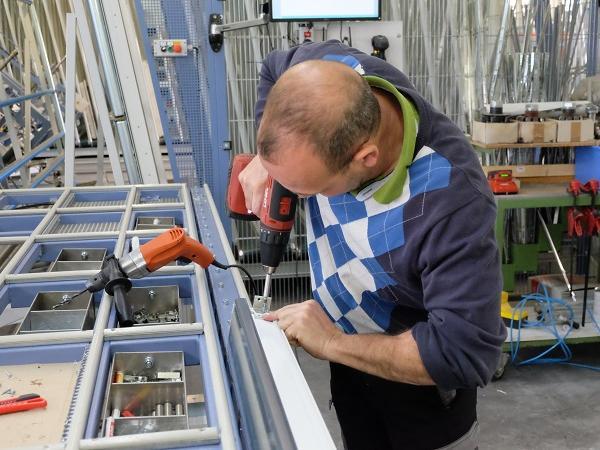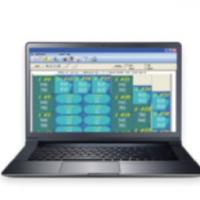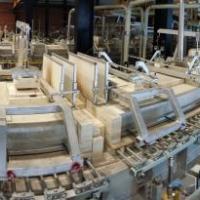The term Industry 4.0 has almost become a “household name” over the past few years. It stands for digitalisation and networking of the entire industrial value chain.
Obviously, digitalisation makes no exception when it comes to the skilled trades so a rethink is therefore also required here. Presented below are some of the special challenges facing the skilled glass-processing trades: many products are becoming smarter.
Put simply, the Smart Home is now bringing windows and doors into the home network. Even if high-tech interactive windows still sound very futuristic, sooner or later they will be able to present multimedia content. In other words: in future your window will serve as a computer, you will be able to use it to go online or watch TV on it. Customers expect modern skilled tradespeople to provide the expert support they always have in this regard.
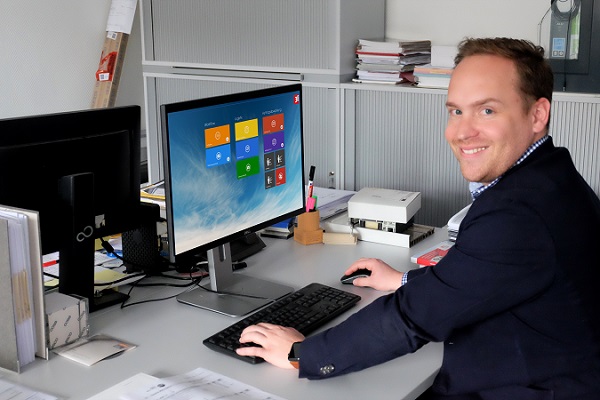
Photo: 3E-Datentechnik
For instance, glazier trade guilds have long since risen to these challenges and have formulated new professional training content in their “Glaser Agenda 2030” (Glazier Agenda 2030). In future, glaziers will diversify and become glass-tronic, window-tronic, window art-tronic, vehicle glass-tronic specialists.
The training to become a master glazier will obviously adapt to the new challenges. Already for several years now the German Federal Guilds Association has successfully cooperated with the Koblenz Chamber of Skilled Trades so that every new master of a trade also leaves the continued education facility in Hadamar as a qualified electrician.
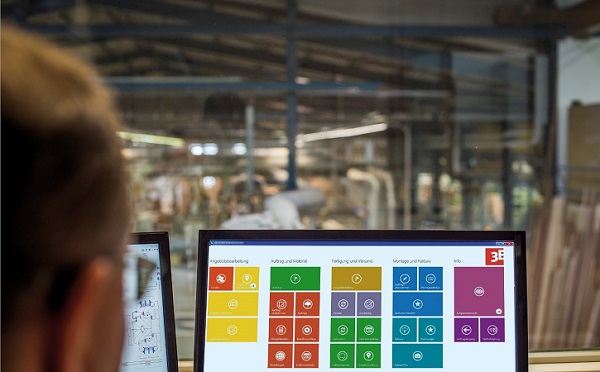
Photo: 3E-Datentechnik
However, specialist knowledge is just one key component. Just as important is strong business acumen and a strategic mind to withstand the competition: just determining glass types for a specific project is old news.
These days, aspiring master craftspeople calculate their jobs from A to Z and obviously have to be able to evaluate aspects like materials, staff deployments, production capacities or even safety at work. Increasingly, these are supported by modern software programs.
“In the glazier trade smart glass is just as much a phrase on our lips as the implementation of Skilled Trades 4.0. Here the interfaces to Industry 4.0 are just as important as the links to customers – who in future we want to reach via an attractive glaziers’ portal,” says Stefan Kieckhöfel, Managing Director of the Federal Association of Glazier Trades (BIV).

Photo: TomTom
Versatile Software for Skilled Tradespeople
In previous years, software providers designed their window manufacturing software primarily for large glass processing operations. For smaller skilled trades outfits such cost-intensive solutions were out of the question.
They were literally left high and dry and had to continue using “homespun” programs. However, software solutions were developed further. Today there are so-called plug-and-play solutions especially for small and medium-sized skilled trades operations that are generally quick and easy to install and intuitive to use.

Photo: TomTom
The programs manage master data for both profiles and fitting. Furthermore, these programs provide support with drafting quotations and assigning jobs. Likewise, the software can also be used for glass and profile jobs or the creation of cutting lists. Programs like this offer tradespeople technical assistance on many levels – for instance the entire CE labelling issue can be presented using the software.
However, company optimisation obviously affects many other areas. A key topic is the innovative route planning to customers as time is not just money for the skilled tradesperson. A supplier of mobile navigation devices offers a so-called SAAS (Software-as-a-Service) that was designed especially for small enterprises with ten or less vehicles.
Via mobile navigation devices built into the vehicles a link to the satellite is created that transmits the precise location to a central computer at all times. In real time a map shows where the installers currently are and what route they are taking.
This means at HQ they know exactly how much time a fitter needs to reach the next customer. At short notice they can also transmit incoming jobs directly to the fitter located the shortest drive away from the customer. The software also offers the opportunity to send the driver new jobs directly to the display unit inside the vehicle.
In these times of increasing traffic and permanently blocked roads a route planner can be utilised so much more effectively. And the fitter no longer has to plan their daily route themselves – as this can now be done centrally.
An integrated time log, GPS location, communication and navigation functions form the basis – making it possible to coordinate the jobs accordingly and optimise routes and timings using the calculated route suggestions. This ultimately saves time and money on expensive fuel outlays.
The software is designed in such a way as to make it possible to integrate the entire fleet data via an interface into already existent office software – for instance for payroll and vehicle routing.

Photo: TomTom
Changing Purchasing and Information Behaviour
Digitalisation has long since spread into consumers’ living rooms and people’s purchasing behaviour has changed accordingly. Many of the everyday things in life are now purchased online as a matter of course.
Here digital skilled trade portals for windows and doors that cover all support including country-wide fitting are today still quite rare. Obviously, here too, like with any other online business, initial information can be gathered conveniently from the home via smartphones, tablets or desktops and even the customisation of building elements can be actioned online.
While at present it is largely only Internet-savvy customers who order their windows and doors online, the portals are becoming ever more user-friendly and it might be no more than just five to eight years before convenient online shopping very much takes hold in this sector. This trend also presents many skilled trades operations with new and major challenges.
How a glass and window manufacturing SME rises to all these challenges in concrete terms is described by Tim Stebani, Managing Director at Glas Stebani in Essen. A skilled trade company founded 70 years ago it has always had to react to ever-changing market conditions over the years.
“The requirements made of the products are becoming ever more complex increasingly requiring us to draw on expertise from other trades. For instance, over the past few years an interesting network has developed revolving around windows and façades which we are able to fall back on at practically all times,” explains their Managing Director.
Asked specifically about digitalisation Tim Stebani sees the combination of online shop and personal advice and support as one of his company’s main strengths. Many customers, he believes, still prefer to buy complex building elements regionally.
This “locational advantage” benefits the specialist skilled trade overall. Nevertheless, firms must obviously offer their customers the chance to gather comprehensive information online. And they have to find answers to threatening issues of specialist staff shortages to be able to still guarantee personal ties to their customers as well as fast delivery times.
Links:
https://telematics.tomtom.com/handwerk
https://www.3e-it.com/
https://www.glasstebani.com/
www.glaserhandwerk.de

